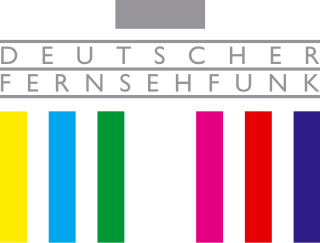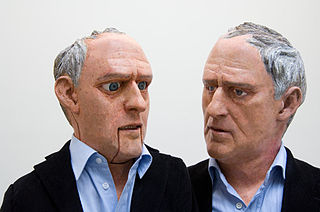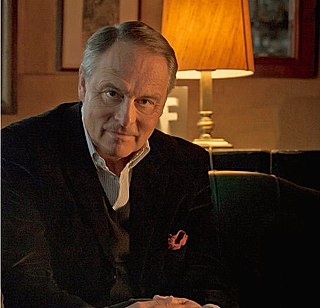
ZDF, short for Zweites Deutsches Fernsehen, is a German public-service television broadcaster based in Mainz, Rhineland-Palatinate. Launched on 1 April 1963, it is run as an independent nonprofit institution, and was founded by all federal states of Germany. ZDF is financed by television licence fees and advertising revenues.

Curd Gustav Andreas Gottlieb Franz Jürgens was a German-Austrian stage and film actor. He was usually billed in English-speaking films as Curt Jurgens. He was well known for playing Ernst Udet in Des Teufels General. His English-language roles include James Bond villain Karl Stromberg in The Spy Who Loved Me (1977), Éric Carradine in And God Created Woman (1956), and Professor Immanuel Rath in The Blue Angel (1959).

ARD is a joint organisation of Germany's regional public-service broadcasters. It was founded in 1950 in West Germany to represent the common interests of the new, decentralised, post-war broadcasting services – in particular the introduction of a joint television network.
Tagesschau is a German national and international television news service produced by the editorial staff of ARD-aktuell on behalf of the German public-service television network ARD.
Elisabeth Grümmer was a German soprano. She has been described as "a singer blessed with elegant musicality, warm-hearted sincerity, and a voice of exceptional beauty".

Martin Fischer-Dieskau is a German conductor.

Cesare Siepi was an Italian opera singer, generally considered to have been one of the finest basses of the post-war period. His voice was characterised by a deep, warm timbre, a full, resonant, wide-ranging lower register with relaxed vibrato, and a ringing, vibrant upper register. Although renowned as a Verdian bass, his tall, striking presence and the elegance of phrasing made him a natural for the role of Don Giovanni. He can be seen in that role on Paul Czinner's 1954 film of the opera made during an edition of the Salzburg Festival under the baton of Wilhelm Furtwängler.

Wolfgang Lippert is a German entertainer, singer, and actor. He was one of the most popular entertainers of the GDR. After working as an auto mechanic and photographer, he came into the show business as a TV show host and singer.

Giovanni di Lorenzo is a German-Italian journalist. He is editor-in-chief of German nationwide weekly newspaper Die Zeit and former editor-in-chief of Berlin's liberal daily newspaper Der Tagesspiegel. Additionally di Lorenzo is a prominent talk show host for the Radio Bremen show 3 nach 9 airing monthly on NDR.

The BBC Singers is a professional British chamber choir, employed by the BBC. Its origins can be traced to 1924. One of the six BBC Performing Groups, the BBC Singers are based at the BBC Maida Vale Studios in London. The only full-time professional British choir, the BBC Singers feature in live concerts, radio transmissions, recordings and education workshops. The choir often performs alongside other BBC Performing Groups, such as the BBC Symphony Orchestra, and is a regular guest at the BBC Proms. Broadcasts are made from locations around the country: London venues have included St Giles-without-Cripplegate, St John's, Smith Square and St Paul's Church, Knightsbridge.
Dorothea Röschmann is a German soprano. She is famous for her performances in operas by Mozart as well as Lieder.

Deutscher Fernsehfunk was the state television broadcaster in the German Democratic Republic from 1952 to 1991.
Antoine-Pierre de Bavier, also known as Antoine de Bavier and Anton von Bavier was a twentieth-century Swiss clarinettist and orchestral conductor.

Judith Deborah Rakers is a German journalist and television presenter.

Stephan Huber is a German sculptor and object artist.

Carmen Thomas is a German journalist, radio and television presenter, author and lecturer. On television, she was the first woman to present the ZDF's das aktuelle Sportstudio. She worked for public radio, running Hallo Ü-Wagen, a weekly travelling talk radio show for two decades. In 1990 Forbes named her one of the 100 most influential women in Germany.

Gero von Boehm is a German director, journalist and television presenter.

Wolfgang Neuss was a German actor and Kabarett artist. Wolfgang Neuss and Wolfgang Müller (1922–1960) were a popular double act. Beginning in the mid-1960s, Neuss also became famous for his political engagement, first for the SPD, then for the extra-parliamentary opposition, APO. He died in 1989 from a longtime cancer.
The Eifel Literatur Festival is a volunteer-organized literature event held in the Eifel mountains in the German state of Rhineland-Palatinate every two years as part of the state's "Cultural Summer".
Alan John Bangs is a British music journalist, disc jockey and presenter on radio and television. He has lived and worked in Germany since the 1970s.















